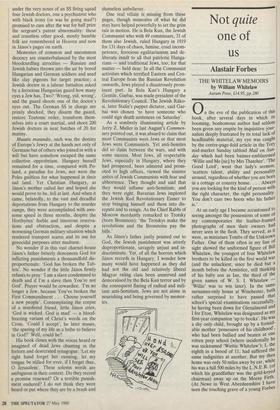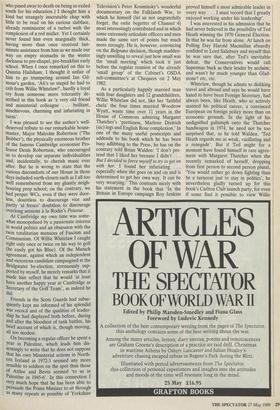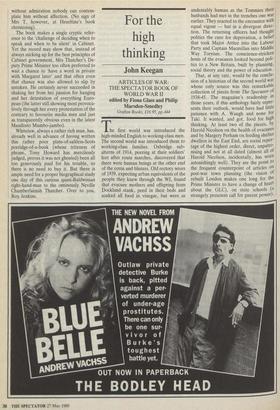Not quite
one of us
Alastair Forbes
THE WHITELAW MEMOIRS by William Whitelaw Aurum Press, £14.95, pp.280 0 n the eve of the publication of this book, after several days in which its booming, bonhomous author had seldom been given any respite by inquisitive jour- nalists deeply frustrated by its total lack of headlinable material, my eye was caught by the centre-page-fold article in the Tory mid-market Sunday tabloid Mail on Sun- day which had been banner-emblazoned `Willie and Me [sic] by Mrs Thatcher'. 'The Good Lord', went that lady's sermon, `scatters talent, ability and personality around, regardless of whether you are born in a cottage or country house. . . . Always you are looking for the kind of person with the right character, the right personality. You don't care two hoots who his father is.'
At an early age I became accustomed to seeing amongst the possessions of some of my contemporaries the leather-framed photographs of men their owners had never seen in the flesh. They served, as it were, as miniature Tombs of the Unknown Father. One of them often in my line of sight showed the uniformed figure of Bill Whitelaw, the youngest of four Whitelaw brothers to be killed in the first world war (and the unluckiest, since he died but a month before the Armistice, still thinking of his baby son as Ian, the third of the given names of W. S. I. Whitelaw — `Willie' was to win later). In the same surnames-only house at Winchester, both rather surprised to have passed that school's special examinations successfully, he having been down for Glenalmond and I for Eton, Whitelaw was designated as my first-year companion 'up to books'. He was a shy only child, brought up by a formid- able mother 'possessive of his childhood', who had been bullied and beaten at one rotten prep school (where incidentally he was nicknamed 'Wettie Whitelaw'); I, the eighth in a brood of 11, had suffered the same indignities at another. But my then home was only 50 miles away by car, while his was a full 500 miles by the L.N.E.R. (of which his grandfather was the gold-keyed chairman) away up on the Moray Firth. (At Newe in West Aberdeenshire I have seen the touching grave of a young Forbes who pined away to death on being so exiled south for his education.) I thought him a kind but strangely inscrutable chap with little to be read on his curious slabface, already reminiscent of a turbot with the complexion of a red mullet. Yet I certainly never found him even marginally thick, having more than once received last- minute assistance from him as we made our way on empty stomachs in the winter darkness to pre-chapel, pre-breakfast early school. When I once remarked on this to Quintin Hailsham, I thought it unfair of him to go trumpeting around Ian Gil- mour's garden, 'Ali's so stupid he had to crib from Willie Whitelaw!', hardly a loyal cry from someone more tolerantly de- scribed in this book as 'a very old friend and ministerial colleague . . . brilliant, mischievous, charming and infuriating in turns'.
I was pleased to see the author's well- deserved tribute to our remarkable house- master, Major Malcolm Robertson ('The Bobber'), the physically enormous brother of the famous Cambridge economist Pro- fessor Denis Robertson, who encouraged us to develop our separate individualities and, incidentally, to cherish music ever after. But he is wrong to state that the various discomforts of our House in those days included earth-closets such as I all too well remembered from my ghastly neigh- bouring prep school; on the contrary, we had proper WCs, even if they were door- less, doubtless to discourage vice and partly 'al fresco' doubtless to discourage overlong sessions a la Rodin's Penseur.
At Cambridge my own time was some- what monopolised by a passionate interest in world politics and an obsession with the twin totalitarian menaces of Fascism and Communism. Of Willie Whitelaw I caught sight only once or twice on his way to golf (he easily got his Blue). Of the Munich agreement, against which an independent and victorious candidate campaigned at the Bridgwater by-election, strenuously sup- ported by myself, he merely remarks that it made him reflect that he would 'at least have another happy year at Cambridge as Secretary of the Golf Team', as indeed he did.
Friends in the Scots Guards had subse- quently kept me informed of his splendid war record and of the qualities of leader- ship he had displayed both before, during and after the bloodiest of tank battles, his brief account of which is, though moving, all too modest.
On becoming a regular officer he spent a year in Palestine, which leads him dis- armingly to write that he does not suppose that his own Ministerial actions in North- ern Ireland in 1972-3 seemed any more sensible to soldiers on the spot than those of Attlee and Bevin seemed `to us in Palestine in 1945-6'. In this connection I very much hope that he has been able to persuade the Prime Minister to sit through as many repeats as possible of Yorkshire Television's Peter Kosminsky's wonderful documentary on the Falklands War, to which he himself (let us not ungratefully forget, the onlie begetter of Channel 4) most interestingly contributed and in which some extremely articulate officers and men made the same sort of points but much more strongly. He is, however, convincing on the Belgrano decision, though madden- ingly unwilling to reveal just how small was the 'small meeting' which took it just before the regular reunion of the already 'small group' of the Cabinet's OSDA sub-committee's at Chequers on 2 May 1982.
As a particularly happily married man with four daughters and 12 grandchildren, Willie Whitelaw did not, like her 'faithful chela' the four times married Woodrow Wyatt, waste time over 11 years in the House of Commons admiring Margaret Thatcher's 'prettiness, Marlene Dietrich (sic) legs and English Rose complexion.' In one of the many useful postscripts and addenda to his book which he has been busy adlibbing to the Press, he has on the contrary told Brian Walden: 'I don't pre- tend that I liked her because I didn't . . . But I decided to force myself to try to get on with her. I found her infuriating . . . especially when she goes on and on and is determined to get her own way. It can be very wearying.' This contrasts nicely with his statement in the book that 'In the Britain in Europe campaign Roy Jenkins proved himself a most admirable leader in every way . . . I must record that I greatly enjoyed working under his leadership'.
I was interested in his admission that he had never believed in the possibility of Ted Heath winning the 1970 General Election. In that he was far from alone. At lunch on Polling Day Harold Macmillan absurdly confided to Lord Salisbury and myself that he was sure that, after Ted's inevitable defeat, the Conservatives would call Supermac back as their leader by acclaim; and wasn't he much younger than Glad- stone? etc, etc.
Whitelaw, though he admits to disliking travel and abroad and says he would have hated to have been Foreign Secretary, had always been, like Heath, who so actively assisted his political career, a convinced European on foreign policy more than on economic grounds. In the light of his undignified gallumph onto the Thatcher bandwagon in 1974, he need not be too surprised that, as he told Walden, 'Ted Heath regards me as weak, vacillating and a renegade'. But if Ted might for a moment have found himself in rare agree- ment with Margaret Thatcher when she recently remarked of herself, dropping from first person to second person plural, 'You would rather go down fighting than be a turncoat just to stay in politics', he nevertheless gladly turned up for this book's Carlton Club launch party, for even if some find it possible to view Willie without admiration nobody can contem- plate him without affection. (No sign of Mrs T, however, at Heseltine's book christening).
The book makes a single cryptic refer- ence to the 'challenge of deciding when to speak and when to be silent' in Cabinet. Yet the record may show that, instead of always sticking up for the best principles of Cabinet government, Mrs Thatcher's De- puty Prime Minister too often preferred to wait a chance to 'have a word in private with Margaret later' and that often even that chance was also allowed to slip by untaken. He certainly never succeeded in shaking her from her passion for hanging and her detestation of everything Euro- pean (the latter still showing most provoca- tively through her every protestation of the contrary to favourite media men and just as transparently obvious even in the latest Manifesto Mumbo-jumbo).
Whitelaw, always a rather rich man, has, already well in advance of having written this rather poor plate-of-saltless-Scots porridge-of-a-book (whose triteness of phrase, Tony Howard has mercilessly judged, proves it was not ghosted) been all too generously paid for his trouble, so there is no need to buy it. But there is ample need for a proper biographical study one day of this curious quasi-Baldwinian right-hand-man to the ominously Neville Chamberlainish Thatcher. Over to you, Roy Jenkins.




















































 Previous page
Previous page